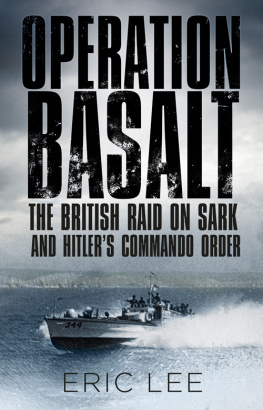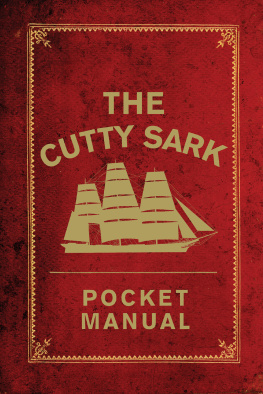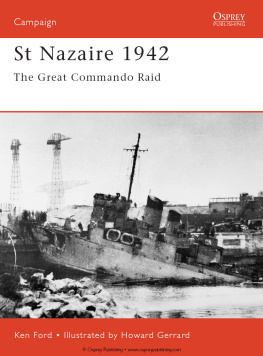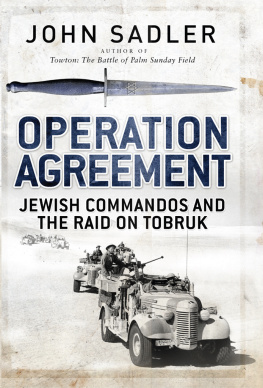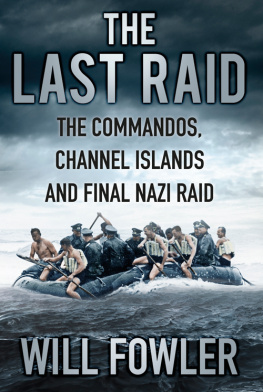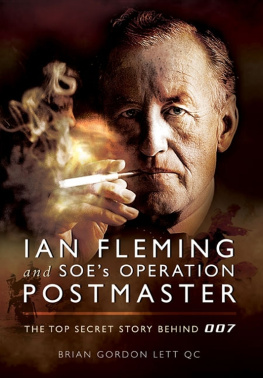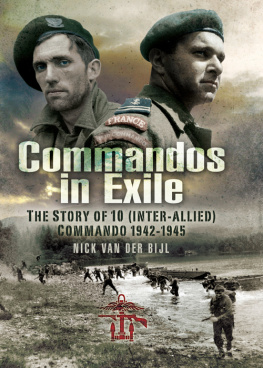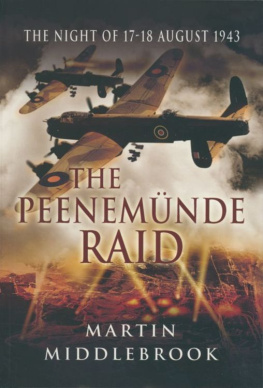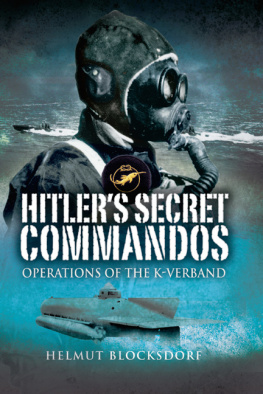
Dedicated to all those who risked everything, and sometimes lost everything, in the fight against fascism then and now.
Visit the website at www.operationbasalt.com
Living in London has given me a great advantage in writing this book. Ive had free and easy access to three great research institutions: the British Library, The National Archives and the Imperial War Museum. The first of these has been like a second home to me over many months and I am very grateful for the services offered by all three.
In Sark, Id like to thank Dr Richard Axton and La Socit Sercquaise for all their help, including access to their archives and the archives of the Seigneur. It was a great privilege to be able to address members of the Socit and other local residents of Sark in February 2015. I was also able to interview three veterans of that period, Werner and Phyllis Rang and Esther Perree. I appreciate the assistance of Richard Dewe and Kevin Adams in helping to find photos and, in Richards case, for first pointing me to the mysterious case of Major Skelton. Jeremy La Trobe-Bateman was very helpful as my guide, when we retraced the route taken by commandos.
In Guernsey, I was helped by Richard Heaume of the German Occupation Museum, and was also able to spend a most interesting afternoon using the Island Archives, which contain a great deal of material about Sark during the war.
Id like to thank Doris Theuerkauf, the daughter of Oberleutnant Herdt, for her memories and photos. I want to thank the Deutsche Dienststelle fr die Benachrichtigung der nchsten Angehrigen von Gefallenen der ehemaligen deutschen Wehrmacht (WASt) for providing me with Obergefreiter Hermann Weinreichs PWIB Form No. 2, which tells what happened to him after his capture by British commandos.
Peter Stokes and Graham Robinson, the sons of Sergeant Horace Stokey Stokes and Sergeant Joseph Henry Tim Robinson, generously shared their memories.
Thanks also to authors Peter Jacobs, for sharing material from Colin Ogden-Smiths diary, and Brian Lett for answering several questions. Thanks also to Jak P. Mallmann Showell and Lawrence Paterson for sharing their expertise regarding MTB and answering my questions.
In Dorset, Jeremy and Rosemary Isaac kindly showed me around the gardens and the chapel at Anderson Manor, telling me what they had learned over the years about the commandos who stayed there. Phillip Ventham, a local historian in the area and the organiser of the 1988 meeting of the surviving commandos there, also gave some helpful pointers in my research.
Im deeply in debt to all those who agreed to read this manuscript and for their helpful comments: Dr Richard Axton, Roger Darlington, Gary Kent, Martin Lee, Doerte Letzmann, John McCarthy and Dr Hilary Sapire.
I would like to thank the Authors Foundation (Society of Authors) for their generous grant that made research on Sark possible.
Thanks also to Michael Leventhal at The History Press for taking this project on and for his enthusiastic support throughout.
Traditionally authors at this point thank their families for support, for tolerating them during their many months long obsession with the subject of the book, and so on. I can now understand why. It was in conversation with my partner Cindy Berman that I first came up with the idea for this book while wandering along Sarks beautiful clifftop paths. Little did she know that it would mean walls in our home covered with Post-it notes about Operation Basalt, a huge wall map of Sark, and photos of the various commandos (including a particularly mean-looking Anders Lassen). Appleyard and his men, the Dame of Sark, Mrs Pittard, even Little Steve all became part of our family for the last few months, ever present in our discussions and our lives. I hope it was worth it.
CONTENTS
A FOOTNOTE TO HISTORY
This book tells the story of Operation Basalt, a British commando raid on the tiny Channel Island of Sark in October 1942. At first glance, that seems a rather unimportant story, a footnote to history (and a rather small one at that). After all, this was a time when millions of men and women were engaged in a colossal conflict that spanned the entire globe.
Sark had no strategic value of any kind, a population of fewer than 500 people and 103 cows, and a landmass of 5 sq. km. One wonders what the German Army was doing there at all. Sark is one of the smallest of the Channel Islands, fiercely independent, with its own feudal system of government. So little was known about it in 1940 that the German soldiers sent to occupy it actually had to wire their superiors in Berlin to find out if Sark was even technically at war with the Third Reich.
Within a few weeks of this raid, the Wehrmacht would suffer a major defeat in the Second Battle of El Alamein, where the legendary Afrika Korps of Field Marshal Erwin Rommel would lose over 30,000 men. Churchill would later write, Before Alamein we never had a victory. After Alamein we never had a defeat.
Just two weeks after the Sark raid, an even greater battle would begin in Stalingrad. Over the course of the next several months, an entire German army would be destroyed there. There would be hundreds of thousands of casualties on both sides.
In the larger frame of things, the commando raid on tiny Sark was surely insignificant. And yet for two men, this commando raid was hugely important. Those men were Winston Churchill and Adolf Hitler. From the moment the Germans seized the Channel Islands in 1940, Churchill was demanding from his generals a plan to liberate them. Churchill was a strong advocate of what were called butcher and bolt raids, which were aimed at making life for German soldiers anywhere in Nazi-occupied Europe as unpleasant as possible. In addition to terrorising the enemy, these raids were designed to gather intelligence that would be used later on when Allied forces would invade the European continent.
Churchills personal interest in the raid on Sark was shown by his decision to invite the commando officer who led it to a private meeting in London a day after the raid. Churchill believed that small-scale raids would test German defences, keep them on their toes and compel them to keep large numbers of troops tied down in areas of no strategic significance throughout the war. If successful, the raids could also raise morale at home, which was essential following a string of bitter defeats for Britain and her allies.
Adolf Hitler also took an unusual interest in the Channel Islands. He had views about the loyalty of the Channel Islanders to the British Crown, a vision of which country the islands would belong to at wars end and even a plan to use the islands as a rest home for German working men and women. Hitler anticipated the October 1942 raid on Sark, or raids like it, even when his commanders insisted that the islands would not be targeted by the British. In a directive issued on 20 October 1941, a year before the Basalt raid, Hitler acknowledged that large-scale British assaults on the occupied Channel Islands were unlikely, but on political and propaganda grounds isolated English attacks must be expected at all times. He gave orders for the islands to be heavily fortified, each of them transformed into a Festung (fortress). He also demanded the deportation to Germany of civilians who might be security risks.
The news of the commando raid on 3 October 1942 moved swiftly up the Wehrmacht chain of command to Berlin and the German response to it affected the lives of everyone living in Sark civilians and soldiers alike. But the German response went much further, culminating in Hitlers infamous Kommandobefehl (Commando Order), which was a death sentence for many Allied commandos, and a significant German war crime, raised in the Nuremberg trials.
Next page
